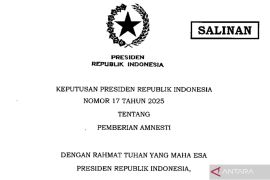Coordinating Minister for Law, Human Rights, Immigration, and Corrections, Yusril Ihza Mahendra, stated that the Bill was drafted in accordance with current conditions in Indonesia during the transition from the old Criminal Code, which had been in place since the Dutch colonization, to the National Criminal Code.
"The National Criminal Code will not allow immediate death penalty," he stated on Tuesday (April 8).
Mahendra explained that the new Criminal Code requires death row convicts to serve a 10-year imprisonment term to assess whether they have genuinely repented and regret their actions.
If deemed repentant, their sentence can be commuted to life imprisonment. This provision applies to death row convicts, both Indonesian and foreign citizens, he added.
Earlier, Ramoti Samuel, a drafter from the Ministry of Law and Human Rights, confirmed that the death penalty is no longer a principal punishment but a special one in the new Criminal Code.
In a public discussion marking International Anti-Death Penalty Day 2024, Samuel stated that Law Number 1 of 2023 concerning the Criminal Code (KUHP) states that commutation or replacement of the death penalty is no longer included as a principal punishment.
"The law states that the death penalty is the most severe punishment and must always be considered as an alternative to life imprisonment or a maximum of 20 years in prison," he remarked during a discussion in October 2024.
He noted that the death penalty is imposed as an alternative to severe punishment to deter criminal acts and protect the community. Hence, he added that this sanction will be determined in a separate article.
According to Samuel, the death penalty may become another form of punishment in accordance with Article 68, paragraph (3) of the Criminal Code, which will come into effect in January 2026.
"For a choice between the death penalty and life imprisonment or an aggravation of the sentence for a crime with a 15-year imprisonment, a prison sentence for a certain period can be imposed for 20 consecutive years," he elaborated.
Additionally, the new Criminal Code emphasizes the postponement of the death penalty with several criteria in accordance with Article 99, paragraph (4), for pregnant women, breastfeeding mothers, and people with mental disorders.
Related news: Death penalty to help eradicate corruption: Official
Related news: Corruption may invite death penalty: Attorney General
Related news: Komnas HAM urges government to pursue abolition of death penalty
Translator: Agatha Olivia, Resinta Sulistiyandari
Editor: Primayanti
Copyright © ANTARA 2025









